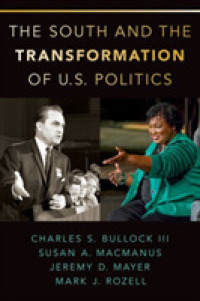- ホーム
- > 洋書
- > 英文書
- > Politics / International Relations
Full Description
What Do We Owe Each Other? includes essays by some of the finest social and political policy researchers in the United States. They address critical issues in contemporary American society. These range from the making of public opinion, the nature of the presumed social contract between government and its people, the special place of corporate governance and institutional investors with respect to social stability, the search for educational equality in a world of growing income disparities, the huge run up in prison populations and the decline of American citizenship, and not least, the ethical issues of selfless and selfish motivations with respect to organ transplants, and the sale of body parts.Although the volume is clearly focused on the United States of the past and present, it offers a long view of how social trends take on distinctive moral characteristics. The opening essay by Katherine Newman of Princeton University and Elisabeth Jacobs of Harvard University carefully documents how the political and social goals of the New Deal era outstripped the public opinion views of the time. They rise to a special level of analysis on how the policy processes can be uneven in one era and yet translate into a general good in later periods. Economic recovery and ideological dispositions were not in sync during the New Deal. As the contributors show, such disparities remain true of the American political process as a whole.The contributors display a wide diversity of opinion, but the volume is unified by the belief that ethical concerns play as large a role in defining American society as do economic interests. The book should attract the attention of political scientists, sociologists, economists, and above all, those people interested in how policy analysis is fused with moral considerations at the start as well as at the close of decision making as such. Howard L. Rosenthal is a professor of politics at New York University. He is the author of many journal articles and coauthor, with Alberto Alesina of Partisan Politics, Divided Government, and the Economy, and coauthor with Keith T. Poole of Ideology and Congress (available from Transaction).
Contents
Introduction; Brothers' Keepers?: The Limits of Social Solidarity in the New Deal Era 1; Public Opinion and Collective Obligations; What Do Corporations Owe Citizens? Pensions, Corporate Governance, and the Role of Institutional Investors; The Troubled Quest for Equality in School Finance *; What Body Parts Do We Owe Each Other?; Is Anyone Alien from the Social Contract?; The Prison Boom and the Decline of American Citizenship








